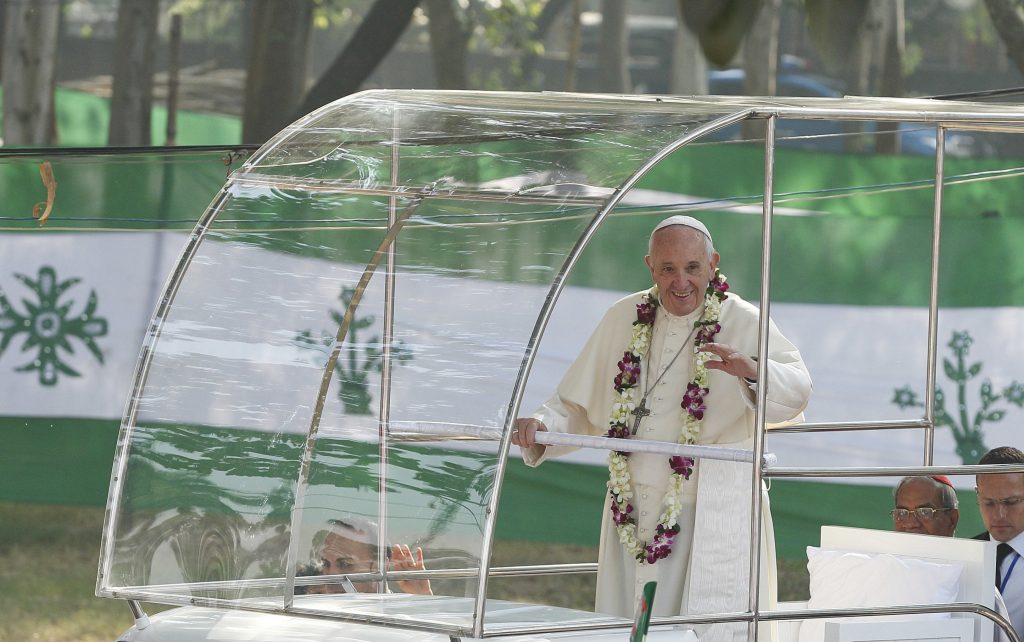On Friday Pope Francis met with the bishops of Bangladesh, urging them to be close to the laity, especially young people and families, and to encourage them to serve the Church according to their particular gifts.
“I would ask you to show ever greater pastoral closeness to the lay faithful,” the Pope said Dec. 1. “Recognize and value the charisms of lay men and women, and encourage them to put their gifts at the service of the Church and of society as a whole.”
According to prepared remarks, he also noted how the months leading up to the next Synod of Bishops, which will take place next Oct. 3-28, challenge bishops to “think about how best to share with our young people the joy, the truth and the beauty of our faith.”
Pope Francis also praised the Bangladeshi Church’s outreach to families, and especially their work for the advancement of women.
“The people of this country are known for their love of family, their sense of hospitality, the respect they show to parents and grandparents, and the care they give to the aged, the infirm and the vulnerable,” he said.
“These values are confirmed and elevated by the Gospel of Jesus Christ. A special word of gratitude is due to all those who work quietly to support Christian families in their mission of bearing daily witness to the Lord’s reconciling love and in making known its redemptive power.”
Pope Francis met with the 12 Bangladeshi bishops at a home for elderly priests in the afternoon of his second day in the south Asian country. It was part of his Nov. 27-Dec. 2 pastoral visit to the countries of Burma, also known as Myanmar, and Bangladesh.
In the morning Dec. 1 the Pope celebrated Mass in Dhaka, the capital city of Bangladesh, ordaining 16 men to the priesthood.
Catholics are a small minority in Bangladesh, numbering only 375,000 — just 0.2 percent — out of a total population of almost 156 million people. In the country there are just 12 Catholic bishops and 372 total priests, both religious and diocesan, and eight dioceses.
The country has, on the other hand, 1,427 catechists and 1,210 lay missionaries.
In his encounter with the bishops, Pope Francis praised the important work done by the laity in the Catholic Church in Bangladesh, stating that the apostolate of the “many dedicated catechists…is essential for the growth of the faith and for the Christian formation of the next generation.”
“They are true missionaries and leaders of prayer, especially in the more remote areas. Be concerned for their spiritual needs and for their continuing education in the faith,” he urged.
Francis also noted the blessings of the country to have received many vocations to the priesthood and religious life, emphasizing the need for candidates of these vocations to be well-formed and well-prepared to share the beauty and richness of their faith with others, especially their peers.
“In a spirit of communion that bridges the generations, help them to take up with joy and enthusiasm the work others have begun,” he said, “knowing that they themselves will one day be called to pass it on in turn.”
The Pope also commended the “farsighted” 1985 “Pastoral Plan for the Church in Bangladesh,” which he said, “laid out the evangelical principles and priorities that have guided the life and mission of the ecclesial community in this young nation.”
The heart of the pastoral plan, he continued, was the “reality of communion,” which continues to help inspire the missionary zeal of the Church in Bangladesh. Another of its goals was a preferential option for the poor, which has shown to be prophetic of the country’s history of service to the poor, especially in remote areas and tribal communities.
But, he emphasized, “in light of the present refugee crisis, we see how much more needs to be done!”
“The inspiration for your works of assistance to the needy must always be that pastoral charity which is quick to recognize human woundedness and to respond with generosity, one person at a time,” Francis said.
Urging the bishops to work “unremittingly” to foster dialogue and to speak out against violence, especially that which “parades as religion,” the Pope stated that they should seek to replace the “culture of conflict with the culture of encounter.”

